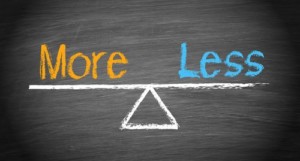🛑 Wasting Sales Time
Contrary to common sense, you can sell more of just about anything by having the discipline to ignore most customers.
Ask the nearest sales leader or sales person, “What is the key to selling more?” You’ll probably get answers like, “Make more sales calls,” or “Improve your closing ratio.” What you’ll rarely hear is, “Narrow the focus of activity to only the most attractive accounts.”
David Ogilvy, known as the father of advertising famously said, “I know for a fact that half my advertising money is wasted. What I don’t know is which half.” I guess you could say the first part of this axiom is also true of sales, but the second part never is. It is absolutely possible to identify the bottom 25-30% of the account base and then ignore it like the plague.
The more competitive your product category, the less you can afford to settle for an intuitive approach. Most sales people, left to their own devices, don’t always pay attention to the value of each account relative to others. A sale is a sale is a sale, right? The only qualification is they don’t currently buy our product, right?
In the wine & spirits industry, our favorite metrics include “accounts sold” and “points of distribution (POD)” which is all well and good, but these measurements hold the potential for a fatal flaw: not all accounts are equally deserving of a sales team’s time and attention. You might have heard of the 80/20 rule, a.k.a., the Pareto Principle. But it’s the 80/20/30 Rule (see the book Success Forces by Joseph Sugarman) that holds the bigger warning. Sugarman said you should consider saying “goodbye” to the bottom 30% of accounts because time spent there will cut your potential in half!
Today both the data and the tools exist to employ a more disciplined approach to territory management. There are two parts to this: identify the accounts with the most potential and restrict sales activity to only these “target accounts.” This is especially true when the number of customers and prospects is large. One of the worst mistakes a sales leader can make is to allow his/her sales people to confuse activity with achievement.
For those sales leaders still sitting on the sidelines of the CRM game lamenting the high cost and “Big Brother” stigma, this is your wake-up call. The key to accelerating sales performance is to move away from a “just-do-it,” intuitive approach and towards a more disciplined, empirical one. And how anyone could dream of getting that done without a modern CRM system is completely beyond me.
Speaking strictly for the adult beverage industry, there are too many forces working against the average winery or distillery or brewery (competition, distributor consolidation, cost of promotion, etc.) to not use a more disciplined approach in deploying your sales resources. The good news is even the smallest company can compete and win by making the mental shift to “less is more.”

